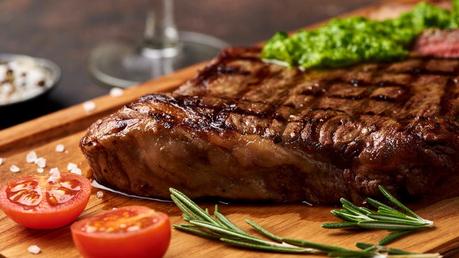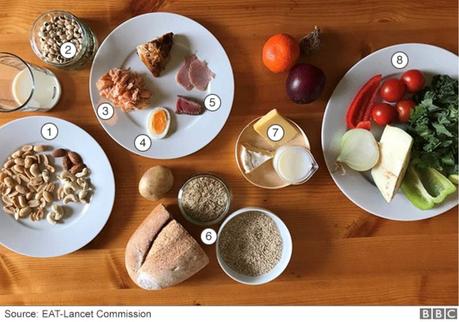
A new, high-profile report was released this week, which claims that in order to save the planet from climate-change disaster, the world must drastically cut meat-eating by more than 80 per cent in developed countries.
Moreover, the report claims consumption of all animal sourced foods, including eggs, butter, cheese and dairy products, must also be drastically reduced across the world for planetary health. Instead, the consumption of legumes, fruit, vegetables, nuts, seeds and healthy grains needs to increase in some regions by more than 100 percent, the report says.
What should you make of this sweeping edict? Below we discuss four key facts that it could help to know when trying to understand this report and when considering how you should weigh its recommendations.
First, however, some quick background: The EAT-Lancet Commission report, three years in the making, was published in The Lancet on January 17. It was the work of 19 commissioners plus an additional 18 co-authors from 16 countries who comprise the EAT Forum. They state that unhealthy and unsustainable food poses a global risk to people and the planet and that they represent the "science-based global platform for food system transformation."
The Lancet: Food in the Anthropocene: The EAT- Lancet Commission on healthy diets from sustainable food systemsIn an accompanying commentary, Lancet editor-in-chief Richard Horton and deputy editor Tamara Lucas say the journal's publication of this sweeping and controversial report "could be neither more timely nor more urgent" because "civilisation is in crisis. We can no longer feed our population a healthy diet while balancing planetary resources."
The Lancet commentary: The 21st-century great food transformationTake note: You will be hearing a lot about this report in the weeks and months to come as the well-funded EAT-Lancet commission launches a huge public relations push, with dozens of high-profile events lined up across the globe to promote its findings and recommendations.
The report, of course, is all over the news, too, with media not yet questioning the advice but simply reporting the 51-page report's findings and recommendations.
BBC: The diet to save lives, the planet and feed us all? Time: Less beef, more beans; Report recommends a new diet for planetary health Guardian: New plant-focused diet would transform planet's future, say scientists Independent: Planetary health diet: Developed countries must cut red meat eating by 80% to protect earthSo, what does the proposed diet look like? Here is a visual of a typical day's provisions:

- Nuts - 50 g a day
- Beans, chickpeas, lentils and other legumes - 75 g a day
- Fish - 28 g a day
- Eggs - 13 g a day (so one and a bit a week)
- Meat - 14 g a day of red meat and 29 g a day of chicken (equivalent to one meatball)
- Carbs - whole grains like bread and rice 232 g a day and 50 g a day of starchy vegetables
- Dairy - 250 g - the equivalent of one glass of milk
- Vegetables - (300 g) and fruit (200 g)
We want to re-assure you that including animal-sourced foods in your diet is safe for your health and safe for the planet by focusing on what we do know.
Here are four key facts
1. Meat and animal-sourced foods are healthy and nutritious
Animal-sourced foods like meat, eggs and dairy are healthy, nutritious foods that are uniquely satiating and provide more protein and nutrition per ounce than beans, legumes and other vegetable sources of protein.
Cardiologist and Diet Doctor team member Dr. Bret Scher notes that in his practice he has had many patients who have tried to adopt a strict vegetarian or even vegan diet but have not been able to sustain it due to health or hunger issues.
As a cardiologist, I've made healthy lifestyle recommendations to thousands of patients, and it is clear that the best lifestyle is one people can actually maintain over the long term. It turns out that animal protein and fat are uniquely satiating - thus keeping hunger at bay - and therefore a friend to any dieter.
Scher notes, however, there is no one-size-fits-all diet:
It is lamentable that the EAT-Lancet authors should want to impose their ideas about healthy diets on all populations worldwide.
Others, such as The Nutrition Coalition, are also noting the report's proclamation that red meat is bad for health has no firm basis in scientific research, being solely based on weak epidemiological data.
The Nutrition Coalition: Scientific evidence on red meat and healthWhile a healthy vegetarian low-carb diet is possible and Diet Doctor provides a large number of vegetarian recipes and vegetarian information, in no way is it necessary for better health to avoid animal sourced foods.
2. EAT-Lancet diet is nutritionally incomplete
Would the report's recommended diet provide all the nutrients humans need to thrive?
UK dietitian Zoë Harcombe, PhD has done an excellent analysis of the nutritional components of the EAT-Lancet report's suggested global reference diet and finds it comes up short in nutritional needs.
She has found that the diet is seriously deficient in B12, retinol, vitamin D, iron, vitamin K2, sodium, potassium and calcium. The diet is also deficient in omega-3, an essential fatty acid for nerve and brain health and has unhealthy amounts of inflammatory omega-6 fatty acids.
Zoë Harcombe: The EAT Lancet diet is nutritionally deficient3. Ideological bias underlies the report
Was this three-year endeavour the result of a broad-based research effort, that included scientific researchers of all stripes and backgrounds, with no-preconceived notions, weighing all the evidence and coming to an unbiased conclusion?
No, not at all. In fact, many of the leading commissioners on the report have for years been promoting a plant-based diet and publicising the negative health and environmental impacts of animal-sourced products.
In short, the plant-based "solution" came first, which lets us know that it is not a response to a well-investigated understanding of the problem, but an opportunistic application of an ideology to a complex world problem.
Belgium academic, Professor Frederic LeRoy and UK professor Martin Cohen, writing for the European Food Agency (EFA) expose the industrial money from the agricultural soy sector and from vegan billionaire interests behind the EAT-Lancet endeavour.
LeRoy & Cohen: The Eat-Lancet controversial campaignThey note:
A closer look into its background reveals some perturbing elements. The danger is that the overstatement of certain concerns will result in an anti-livestock narrative, create a false impression of scientific consensus and do more harm than good in a world in need of nutrient-rich meals and sustainable food systems.
Author Nina Teicholz, of The Nutrition Coalition, has examined the potential ideological bias of one of the leading authors of the report, Harvard's Dr. William Willet. His potential conflict of interest includes decades of promoting a plant-based diet, as well as writing books on vegetarianism and developing vegetarian food products.
Nutrition coalition: Walter Willet's potential conflict of interestCompletely absent from the commission were any of the leading global researchers who study the role of ruminants in improving soil health. Also missing was any consideration of the global movement to use improved livestock practices to draw carbon out of the air and sequester carbon in the soil as a way to help address climate change.
Which leads to the final point...
4. Animals are an essential part of a healthy environment
Livestock like cows, pigs, sheep and goats graze on lands that are unable to support crop-based agriculture. They eat grass and stubble and other organic matter that humans cannot eat and turn it into nutritious proteins and fats. Their manure and urine fertilize the soil, providing a rich substrate on which plants can feed.
Done right, it is a holistic, ecologically-balanced cycle that benefits the land and planet, the humans who eat the food and the livestock itself, who are raised in humane and healthy conditions.
That said, there is no doubt that our current system of industrialized, polluting agriculture can be - and MUST be - hugely improved. There is also no question that climate change poses a fundamental and urgent challenge to how we create enough healthy, wholesome food to feed more than 9 billion people without destroying the planet. However, livestock have a key role in the solutions and are not merely the problem that needs to be eliminated.
Recently, Diet Doctor went into great depth exploring the nuances about these important issues. The result of more than four months of research and interviews, the series presented a possible way forward to have our healthy diet and our thriving planet, too.
As well, others are writing passionately and pointedly about these complex issues. We encourage you to explore these other resources.
Sustainable Dish: 20 Ways EAT-Lancet's global diet is wrongfully vilifying meat Animal Agricultural Alliance: Statement on EAT-Lancet Report, FAQOur food systems do need transformation - away from highly processed, nutrient-poor, sugary foods that undermine human health and promote obesity and chronic diseases like type 2 diabetes. Our industrial agricultural systems need transformation, too, into a more holistic, sustainable model that restores and enhances soil health and include animals as an essential part of a healthy eco-system.
The EAT-Lancet Commission, while endeavoring to address the issues, has come up with a simplistic, pre-conceived solution that does not yet have the balance and the way forward right.
We can and must do better.

